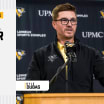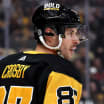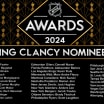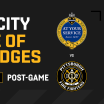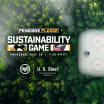Hall of Famer Bryan Trottier has been told many times to write a book over the last four decades. He always thought that it wouldn't be interesting enough, but when Trottier started giving speeches, the seven-time Stanley Cup Champion realized they could actually be on to something.
"You Should Write a Book": Trottier Shows that 'All Roads' Lead Home
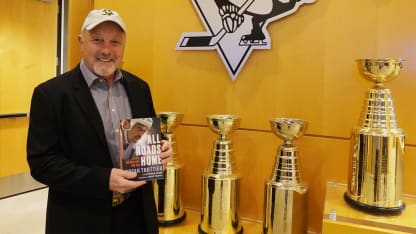
By
Benjamin Gottschalk
Pittsburgh Penguins
"I've always been a little bit guarded as a person, especially as a player," said Trottier, who won back-to-back with Pittsburgh in 1991 and '92. "Talking about myself is not my comfort zone. But when I started reflecting about where I am and sharing the story, it seems to have great appeal. When I'm talking to communities, I go to events or tell these fun stories to family, it's the same response - we should write these down."
Young people in particular have really responded to the stories. While visiting schools and talking with students and their teachers and coaches, Trottier had been hearing the same thing.
"Kids all say, 'you should write a book,'" Trottier said. "Then my grandkids say, 'Grandpa, you should write a book,' because these stories are just so fun."
So Trottier took his handwritten pages to Penguin Random House, who loved them. It resulted in his book All Roads Home: A Life On and Off the Ice. Many of the stories took shape from Trottier's experiences and accomplishments throughout his career, which included four straight Stanley Cups with the New York Islanders from 1980-83. But Bryan spared no detail when talking about life on the ranch in Val Marie, Saskatchewan, where he grew up the son of a Cree/Chippewa/Metis father and an Irish mother.
"I think no matter where I go or what path I took, I was always representing that little home," Trottier said. "I wanted the book to represent where I come from. The fact that I was always homesick, the fact that I couldn't wait to always call home, and the fact that every time I talk about my Canadian or Saskatchewan roots or the little town of Val Marie - it always seems to reflect a bigger part of who I am."
Trottier and Jim Thorpe - the first Native American to win a gold medal for the United States in the Olympics - are considered the two most decorated Indigenous athletes of all time. It's always exciting and rewarding for Trottier to experience the hospitality of First Nations communities, where they recognize him for how far he's come.
"When that happens, you're surprised by it, because we all just think we're just normal regular folks," Trottier said. "So, it is kind of a nice little responsibility, in a sense. But at the same time, I think a lot of us that have played at the National Hockey League level are just wonderful ambassadors. So, whenever I get into the First Nations, I'm just an ambassador of the NHL who played some hockey.
"Yeah, I've got some First Nations blood, but at the same time, I think it gives Indigenous student-athletes hope or inspiration to say you know what, if he can make it, maybe I can too. He was shy, and he didn't want to leave home. He was homesick, and he went to the highest level he could possibly go. So, maybe I can achieve my dream as well."
From food and music to hunting and crafts his grandparents made, Bryan was ingrained in the Cree/Chippewa/Metis culture from a young age, which his Irish mother really embraced.
"I've got this wonderful joy of the Irish side and the First Nation side. I said, gosh, I have this powerful blood, and it's exciting when you're a kid and you take such pride in all this fun stuff," he said. "Having that upbringing, having my parents and grandparents around, and all of us just having the exposure to that culture was fantastic."
In the memoir, Trottier tells tales of his parents, close friends, teammates, and coaches. He also discusses the lessons he has learned from them and their significant influence on the person he became, as well as some amazing moments throughout his illustrious career. The stories initially filled 1,400 pages, so of course, there were some from his playing days with the Penguins that didn't make the final cut.
Like when Mario Lemieux picked him up on the Ice after defeating the Minnesota North Stars in the 1991 Stanley Cup Final. "Mario picked me up like I was a five-year-old and held me over his head," Trottier said. "My feet were off the ground. He's so excited. We're both staring at each other, and I can't paint a bigger smile on a teammate's face. I tried to do it to all my buddies, but I couldn't lift anybody up."
He also mentioned the plane ride back from Minnesota and working out a contract with the Penguins to come back for the following season while on the plane - which paid off, as the team won a second consecutive championship.
And, of course, how Trottier and Phil Bourque partied under nearly every bridge in Pittsburgh for three days straight after winning the Cup. "I don't know how many times we crisscrossed over three days, but neither one of us made it home for three days. There are 400-something bridges in Pittsburgh, and I think we partied under most of them that night."
Along with sharing some of the fun stories throughout his career, Inspiring youth is one of the main things Trottier hopes to achieve with this book. He's already spoken to a couple of Grand Chiefs in the First Nations about getting it into the hands of a lot of students throughout Canada.
"I hope it gives some little bit of insight as to who I am, why I am the way I am, and understanding that I want to influence the next generation of student-athletes or the next indigenous student-athlete in a really positive way," Trottier said.
While this book has been decades in the making, the actual process itself took about five years from the beginning to the end, in what Trottier called "a labor of joy." He has an incredible sense of pride in it now that the book is finished.
"When I do something, I try to do it the best I possibly can and with the best effort," Trottier said. "I think my grandkids will be proud of it, my kids will be proud of it. My family will be proud of it, and hopefully, the hockey world will enjoy it."







